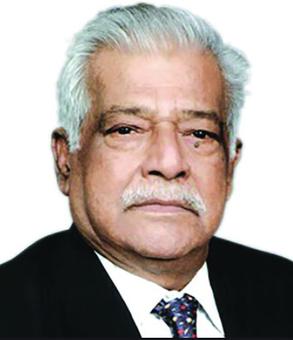Related Research Articles
Syed Nazrul Islam was a Bangladeshi politician and a senior leader of the Awami League. During the Bangladesh Liberation War, he was declared as the Vice President of Bangladesh by the Provisional Government. He served as the Acting President in the absence of Sheikh Mujibur Rahman.
Shah Azizur Rahman was a Bangladeshi politician who served as the prime minister of Bangladesh. However, he was the subject of considerable controversy for his collaboration with the Pakistan Army against the struggle for the independence of Bangladesh.

Moudud Ahmed was a Bangladeshi lawyer and politician. He was a standing committee member of Bangladesh Nationalist Party. Ahmed was elected as a Jatiya Sangsad member total five times from Noakhali-1 and Noakhali-5 constituencies.
Jail Killing Day is observed by the Awami League (AL) of Bangladesh and many other political organisations on 3 November every year. It commemorates the killing of four Awami League and national leaders: former vice-president Syed Nazrul Islam, former prime minister Tajuddin Ahmed and Captain (Rtd.) Mansur Ali, and former home minister A H M Quamruzzaman on this date in 1975.
Chowdhury Kamal Ibne Yousuf was a Bangladeshi politician who served as government minister.

The 1969 East Pakistan uprising was a democratic political uprising in East Pakistan. It was led by the students backed by various political parties such as the Awami League and National Awami Party and specially their student wings against Muhammad Ayub Khan, the president of Pakistan in protest of the military rule, political repressions, Agartala Conspiracy Case and the incarceration of Sheikh Mujibur Rahman and other Bengali nationalists.

The vice-president of Bangladesh was formerly the second highest constitutional office in Bangladesh, when the country was governed under a presidential system. The Vice-President was the first person in the presidential line of succession, in the event of a President's resignation, removal or death. The post was held by several Bangladeshi statesmen during different periods of the country's history. The inaugural office holder was during the Bangladesh Liberation War. The final office holder was Shahabuddin Ahmed. Abdus Sattar was the only vice-president to succeed to the presidency in 1981.

Khandakar Mohammad Obaidur Rahman was a Bangladeshi politician. He was a member of the Jatiya Sangsad in 1973 representing Bangladesh Awami League and in 1979, 1996 and 2001 representing the Bangladesh Nationalist Party (BNP).

Muhammad Yusuf Ali was a Bangladesh politician. He was the first minister for Education and Cultural Affairs in the first cabinet of Bangladesh.

Dr. Abdul Moyeen Khan is a Bangladesh Nationalist Party politician. He is a member of the current Standing Committee of the Party. He served as the Minister of State for Planning, Government of Bangladesh during 1993–1996, Minister of Information during 2001–2002 and the Minister of Science and Information & Communication Technology during 2002–2006. He served as a Member of Bangladesh Parliament from 1991 until 2006.
Abu Saleh Mohammad Mustafizur Rahman was a lieutenant colonel of the Bangladesh Army, a Jatiya Sangsad member of parliament representing the Khulna-2 and Bagerhat-2 constituencies, and a government minister.

Abdul Haleem Chowdhury was a Bangladesh Nationalist Party politician, Member of Parliament, and government minister. He is a retired captain of Pakistan Army and fought in the Bangladesh Liberation War. His son-in-law is Mafizul Islam Khan Kamal.

The Bangladesh Muslim League is a political party in Bangladesh that traces its origins to the All-India Muslim League, established in 1906.

Since the independence of Bangladesh, the presidential election process has been changed several times due to both the presidential and parliamentary arrangements. According to the Second Schedule to the Constitution of 1972, the president of the parliament used to be elected by a secret vote. Later, according to the fourth amendment to the constitution, the provision of the direct election system of presidential election was introduced. But soon after 12th Amendment to the Constitution, the provision of presidential elections through an indirect election was introduced after the parliamentary system was installed. At present, the president is elected by an indirect election by the members of parliament as per Article 48 of the Constitution.
Abdul Momen Khan was a Bangladesh Nationalist Party politician.
Rabeya Chowdhury is a prominent Bangladesh Nationalist Party politician. She is one of the Vice Chairperson of Bangladesh Nationalist Party (BNP), and also the Comilla District BNP President. She is a former Member of the Jatiya Sangsad for three terms from a reserved seat.

The Secretary General of the Bangladesh Nationalist Party is the executive officer of the Nationalist Party, a political organization in Bangladesh. The Secretary General has direct control over all departments in the party. The Secretary General also serves as an advisor to all departments when not directly making decisions. The Secretary General has holistic view over a wide range of issues, ranging from staff appointments to dismissal and approval of the Party's executive branch members. The Secretary General is also responsible for verifying documents, including election expenditures, and delegating functions among the party's organisational editors in consultation with the party chairman.
Dewan Taimur Raja Chowdhury was a Bangladeshi politician, landowner and poet. He was the former member of parliament from Sylhet-7 as a Bangladesh Nationalist Party politician.
Ayesha Sardar is a Bangladesh Nationalist Party politician and the former Member of Parliament of women's reserved seat.
Provincial elections were held in East Pakistan on 17 December 1970, ten days after general elections. A total of 1,850 candidates ran for the 300 seats in the East Pakistan Provincial Assembly. The result was a landslide victory for the Awami League, which won 288 of the 300 seats.
References
- ↑ Chowdhury, Mahfuzul H. (2017-11-01). Democratization in South Asia: Lessons from American Institutions. Routledge. ISBN 9781351773911.
- ↑ "Bangladesh Nationalist Party - Banglapedia". en.banglapedia.org. Retrieved 2018-01-24.